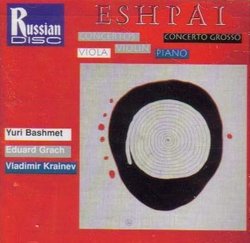| All Artists: Andrei Eshpai, Fedor Glushchenko, Dimitri Kitaenko, Evgeny Svetlanov, Yuri Bashmet, Eduard Grach, Vladimir Krainev, USSR Symphony Orchestra Title: Andrei Eshpai / Piano Concerto, Violin Concerto, Viola Concerto, etc Members Wishing: 0 Total Copies: 0 Label: Russian Disc Release Date: 11/29/1994 Genre: Classical Styles: Forms & Genres, Concertos, Historical Periods, Modern, 20th, & 21st Century Number of Discs: 1 SwapaCD Credits: 1 UPC: 748871105423 |
Search - Andrei Eshpai, Fedor Glushchenko, Dimitri Kitaenko :: Andrei Eshpai / Piano Concerto, Violin Concerto, Viola Concerto, etc
 | Andrei Eshpai, Fedor Glushchenko, Dimitri Kitaenko Andrei Eshpai / Piano Concerto, Violin Concerto, Viola Concerto, etc Genre: Classical
|
Larger Image |
CD Details |
CD ReviewsAll that (Soviet) Jazz Thomas F. Bertonneau | Oswego, NY United States | 11/22/2000 (4 out of 5 stars) "Andrei Eshpai (born 1925) stems from the Mari, a people of the Volga Basin; but he is thoroughly Russified, not to say Sovietized, and never found Socialist Realist musical prescription other than congenial. For many years, he served as Secretary of the Composers Union. I.e., he held the office of chief ideologue among creative artists in the field of music. A prolific composer, he has written in all genres, but specializes in the symphony and the concerto. This Russian Disc anthology of four of his concerti represents Eshpai adequately and holds considerable intrinsic interest for collectors of offbeat, but accessible, twentieth century repertory. Eshpai's works tend to be compact: The longest of these concerti, the one for viola and orchestra (1988), lasts only twenty minutes (about the same time-scale as the Bartók concerto). The work alternates slow and fast music, climbs up from the lower to the higher registers, and concludes with an impressive passacaglia. Yuri Bashmet plays the solo in this 1988 recording, presumably of the première. The Violin Concerto No. 2 (1981) conforms less to the model of organic unity; it strings episodes together in a rather associative manner. The notes say that, in writing the Concerto, Eshpai intended to foreground the influence of his teacher Nicolai Miaskovsky. Maybe so. What one hears is a chain of slightly exotic (think of Khachaturyan) melodies, piquantly harmonized, and entertaining for the nineteen-minute duration of the work. The fifteen-minute Piano Concerto No. 2 (1974), with its slightly jazzy opening of piano-cum-tympany-cum-brass, probably sounded like the non plus ultra of daring modernism in the USSR at the time. Some of the concluding passages sound like the score for a James Bond film! In fact, it's cornier than the stride-piano passages in Bernstein's "Age of Anxiety." Take care, however, what I'm not saying. I'm not saying that it isn't good-humored and amusing. It is. I'll listen with pleasure again and so, I predict, will other purchasers of the CD. The jazz-synthesis also comes to the fore in Eshpai's best-known work, his Concerto Grosso (1967) for trumpet, double bass, piano, vibraphone, and orchestra. All histories of Soviet music comment on the stir made by this piece in its time. Like the Piano Concerto No. 2, it promotes a notion of jazzy mischief hopelessly out-of-date by Western standards, but it ingratiates nonetheless. The recording, from 1974, sounds like the producers made it in a cave, but Eshpai's earnestness wins through despite the sonic limitations. No one will regret buying this CD. See also Eshpai's Fourth and Fifth Symphonies on a companion Russian Disc."
|

 Track Listings (4) - Disc #1
Track Listings (4) - Disc #1